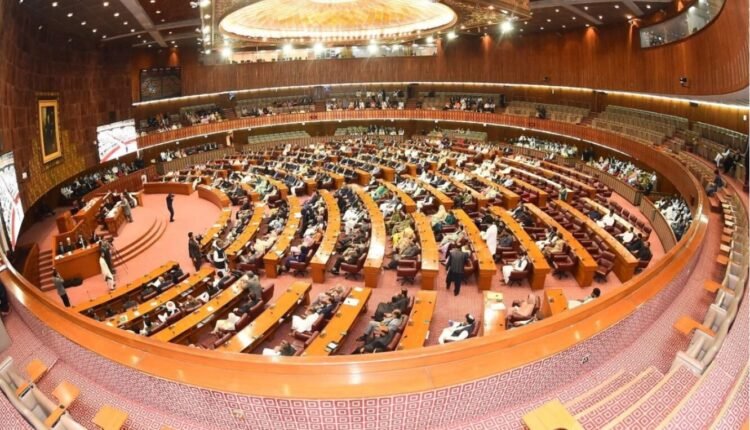Senate Passes 27th Constitutional Amendment Bill 2025 Amid Opposition Protests
The amendment redefines suo motu powers
27th Constitutional Amendment Bill 2025 passed through clause-by-clause voting in the uper house (senate) in Islamabad on Monday night. The session was chaired by Senate Chairman Syed Yousaf Raza Gilani who was reading out each amended clause for approval.
Earlier, clause-by-clause voting was carried out to pass 59 clauses. Later this voting by division was conducted, with the entry and exit gates of the Senate closed as per protocol. While the bells were rung for two minutes.
Amendments were made in various articles, including 10, 17, 42, 105, 146, 152, 159, 168, 175, 176, 214, 239, 243, and 255, through the constitutional bill. The bill comprised 59 clauses, all of which were approved by the Senate with a two-thirds majority (64 votes).
As per the new provisions, the Chief of Army Staff will assume the role of Chief of Defence Forces. The titles of Field Marshal, Marshal of the Air Force, and Admiral of the Fleet will remain for life.
A Federal Constitutional Court will also be established with equal provincial representation.
Meanwhile, the President and Prime Minister will play key roles in judicial appointments, while some powers of the Supreme Court will be transferred to the new court.
Similarly, the Judicial Commission will decide on the transfer of High Court judges, and any objections to such transfers will be reviewed by the Supreme Judicial Council.
The eligibility period for High Court judges for appointment to the Federal Constitutional Court has been reduced from seven to five years. The seniority of sitting Supreme Court judges appointed to the new court will remain intact, while seniority among new appointees from the Bar or High Courts will be determined by age.
The Judicial Commission of Pakistan (JCP) has been expanded to include, in addition to a woman or non-Muslim member, a technocrat nominated by the Speaker of the National Assembly, qualified to become a member of Parliament, ensuring broader merit-based representation.
Key Amendments in Constitutions
The 27th Amendment Bill 2025, presented by Law Minister Azam Nazeer Tarar, introduces significant changes to multiple articles of the Constitution, including Articles 10, 17, 42, 105, 146, 152, 159, 168, 175, 176, 214, 239, 243, and 255.
Key highlights include:
Creation of a Federal Constitutional Court with equal representation from all provinces.
Chief of Army Staff to be designated as Chief of Defence Forces.
Lifetime recognition for Field Marshal and equivalent ranks.
President and Prime Minister to have greater roles in judicial appointments.
Judicial Commission of Pakistan (JCP) empowered to manage judge transfers between courts.
Eligibility for High Court judges to join the new court reduced from seven to five years.
Expansion of JCP to include a technocrat nominated by the National Assembly Speaker, along with a woman or non-Muslim member, ensuring broader representation.
Suo Motu and Judicial Reforms
The amendment redefines suo motu powers, which will now be exercised only upon written application and court satisfaction on constitutional grounds, promoting judicial transparency and restraint.
The bill also extends stay orders in revenue and taxation cases from six months to one year; however, if a case remains undecided beyond this period, the stay will automatically lapse, ensuring timely recovery of public revenue.
Presidential Immunity Clause
A key provision grants immunity to the President during their tenure in office but clarifies that this protection will not apply once the individual assumes any public office after completing the term.
Senate Proceedings
Bells were rung for two minutes before the final voting, and entry and exit gates of the Senate were sealed in accordance with the division procedure. The bill, comprising 59 clauses, was approved clause by clause with the required constitutional majority.


Comments are closed, but trackbacks and pingbacks are open.